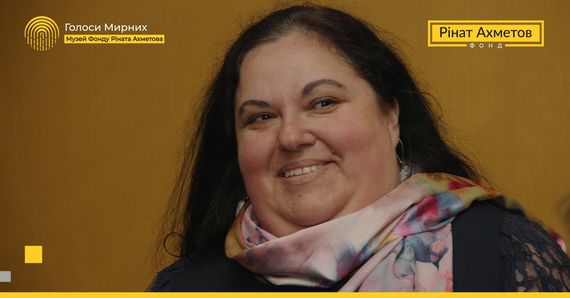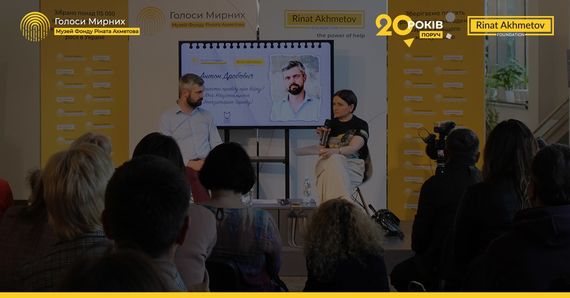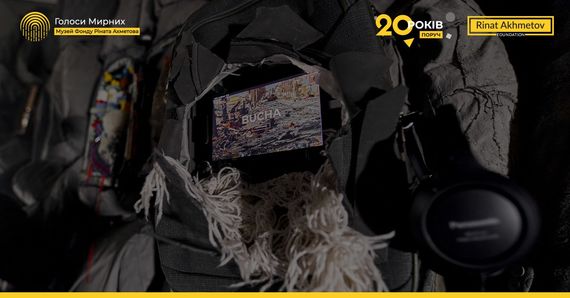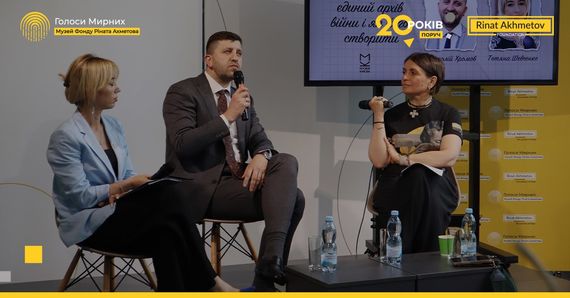"Remembering the past makes us Ukrainians": an interview with Lesia Hasydzhak, Head of the Holodomor Museum, as part of the VOICES Exhibition of The Museum of Civilian Voices

A public interview with Lesia Hasydzhak, PhD in History, Acting Director General of the National Museum of the Holodomor-Genocide, museologist, took place as part of the VOICES Exhibition, a multimedia space of The Museum of Civilian Voices of the Rinat Akhmetov Foundation. The conversation was moderated by Anastasiia Platonova, a cultural critic and curator.
Speaking about the peculiarity of memory museums, Lesia emphasised that they are new to Ukraine, unlike memorial museums.
"In Ukrainian museology, memorial museums were dedicated to personalities. Things, objects that belonged to the person, the house, the space associated with him or her... There was no such thing as a memory museum dedicated to a crucial, difficult event. Therefore, each memory museum began on the basis of feelings and very late: when the material culture of memory was lost, oral history was largely gone as well. So, the most difficult issue was to create a collection, which forms the basis of what makes a museum."
The head of the Holodomor Museum explained how this work changes during a full-scale war because, unlike the events of the distant past, today's museums work with ongoing events.
"The war has actualised museums' missions, tasks, and values. We are not just talking about the history that happened 80 or 90 years ago. All of this has clear parallels, common roots with the causes of the war we live in. There was a period when it seemed that people wanted to live in the future and were only interested in museums of modern science or achievements. But the war has shown how important it is to continue doing what each of us is doing."
Lesia Hasydzhak noted that the National Museum of the Holodomor-Genocide collection has grown by 25% in two years. In times of war, people understand what is valuable and want to preserve it, so, as Anastasiia Platonova aptly put it, they bring their family memories to museums. And when she was asked why it was important to remember the past for the future, Lesia answered as follows:
"It makes us who we are. Ukrainians. This is the basis of identity - memory. And then - simultaneously and in parallel - language and culture. But memory is what unites us."
According to Lesia Hasydzhak, it is important to connect past events with the present in terms of the mechanism of genocide, as well as through witnesses.
"We have a witness - a woman from Zhytomyr region who survived the Holodomor. Her grandchildren are now at war. And this woman weaves camouflage nets. She is 103 years old. This is not about sacrifice or crying but about strength and indestructibility, which is stronger and wins despite everything. We have been, are and will be alive because of it."
The VOICES Exhibition is a multimedia space of The Museum of Civilian Voices of the Rinat Akhmetov Foundation, which, in particular, presents some of the stories from the Museum's 100,000-strong collection. The public interviews open a series of cultural events aimed at preserving the memory of the war. Follow the announcements of new events on the Rinat Akhmetov Foundation's social media.
You can visit the VOICES Exhibition free of charge until April 26, 2024, at the Museum of the History of the City of Kyiv at the following address: 7 Bohdana Khmelnytskoho Street, Kyiv. Curatorial tours are held every Saturday at 3 pm.



